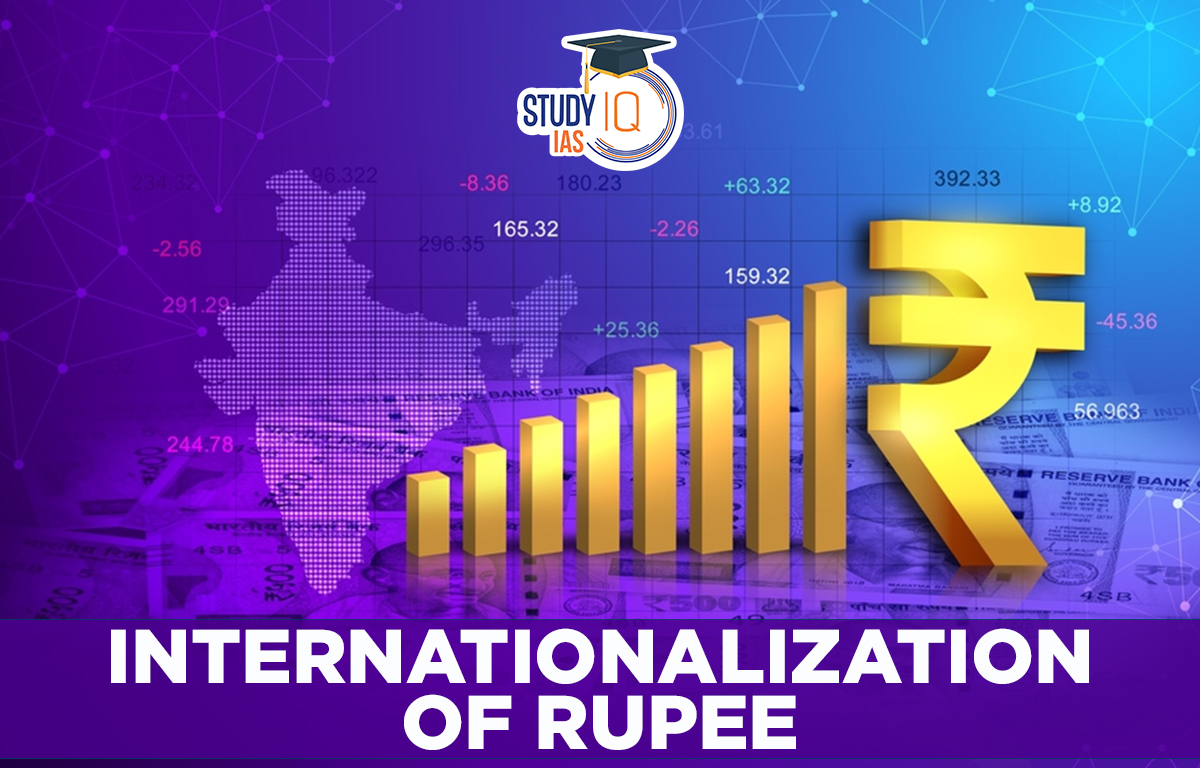Table of Contents
Context: An Inter-Departmental Group (IDG), headed by RBI has recommended various measures to accelerate the pace of internationalisation of the Indian rupee.
What is International Currency?
- The Tarapore Committee on Fuller Capital Account Convertibility (CFAC) defined international currency as ‘a currency that is widely used for international transactions.
- An international currency is supposed to perform three international functions (see image).

- For example, today, the US dollar is the most widely accepted currency for international transactions, followed by Euro.
- In the early 1960s, even Indian rupee was accepted as legal tender in Qatar, UAE, Kuwait, Bahrain, Oman and Malaysia. But, today, almost 86% of India’s imports as well as 86% of the exports are invoiced in dollars.
What is Internationalisation of Indian Rupee?
- Internationalisation of a currency (rupee here) is a process to increase Indian rupee acceptance (credibility) across the world through activities such as:
- Increased use for invoicing and settlement of cross-border transactions
- Freedom for non-residents to hold financial assets/liabilities in rupee
- Freedom for non-residents to tradable balances in Indian rupee at offshore locations.
- It can also be referred to adopting full capital account convertibility, i.e., freedom to convert local financial assets into foreign financial assets and vice versa.
- Currently, India allows partial Capital Account Convertibility and full current account convertibility.
- The IDG said that the Indian rupee has the potential to become an internationalized currency as India is one of the fastest growing countries and has shown remarkable resilience even in the face of major global headwinds.
- It said that higher usage of the Indian rupee in invoicing and settlement of international trade, as well as in capital account transactions, will give the domestic current a progressively international presence.
Benefits of Internationalisation of Indian Rupee
- Reduced Exchange Rate Volatility: Increased international usage of a currency can potentially reduce the exchange rate volatility by increasing demand for the currency, which can make it more stable and predictable.
- Exchange rate volatility is defined as the risk associated with unexpected movements in the exchange rate.
- Reduced Vulnerability to External Shocks: because of reduced dependence on foreign currency.
- Enhanced International Trade: Internationalisation of the Indian rupee can lead to greater acceptance of the currency, which would make international trade easier and more efficient for Indian businesses.
- Improved current account deficit: The use of the Indian rupee for international transactions could potentially reduce trade costs and make it easier for Indian businesses to conduct transactions with foreign partners.
- This, in turn, could lead to an increase in exports and a reduction in imports, which could help to improve the current account balance.
- Enhance India’s global stature and respect: It will help Indian Businesses through increased bargaining power. E.g., Post-2008 recession, Chinese efforts to internationalize Renminbi helped in increasing its global stature.

Challenges in Internationalisation of Indian Rupee
- Complicates Domestic Monetary Policy: The internationalisation of Indian rupee could limit the effectiveness and independence of the RBI in controlling domestic money supply.
- Increased Refinancing Risk: It could aggravate the pass-through risks of external stimulus to domestic financial markets from non-resident holdings of the Indian rupee.
- During a global recession, for example, non-residents could convert their Indian rupee holdings and move out, increasing refinancing risk.
- Heightened Exchange Rate Volatility: The value of the Indian rupee could become more volatile, particularly if the inflation rate is higher than the global rate or from uncontrolled flow of capital.
- Increased Responsibility to Maintain International Financial and Monetary System Order: This puts an increased burden to play the role of “Lender of Last Resort” in case of any global financial crisis.
Recommendations by the Inter-Departmental Group (IDG)
| Short-term measures |
|
| Medium-term measures |
|
| Long-term measures |
|
Way Forward: Internationalization of Indian Rupee has significant benefits but to achieve it successfully, would require some pre-requisites-
- Building a Strong Domestic Financial Market: To successfully withstand external shocks, it is crucial to establish a strong domestic financial market with robust infrastructure, including efficient funding and risk transfer mechanisms.
- Increasing Indian Rupee Acceptance as currency for reserves: i.e., currency in which assets are held. E.g., foreign countries held a total of 7.2 trillion U.S. dollars in U.S. treasury securities as of November 2022.
- Boosting India’s trade: There is a need to enhance India’s Share in Global Merchandise and Commercial Services Trade, helping the Indian rupee to gain global acceptance.
- Handling of capital inflows: Optimal handling of the inflow of capital (volume and composition) using a suitable mix of policies, macro-prudential regulations, and market interventions.


 Daily Quiz 11 July 2025
Daily Quiz 11 July 2025
 Operation Baam: Baloch Separatist Group ...
Operation Baam: Baloch Separatist Group ...
 Article 326 and Electoral Roll Revision ...
Article 326 and Electoral Roll Revision ...





















